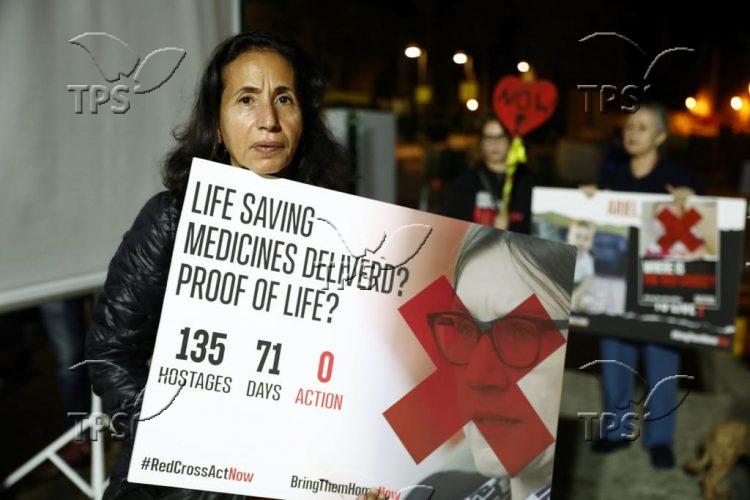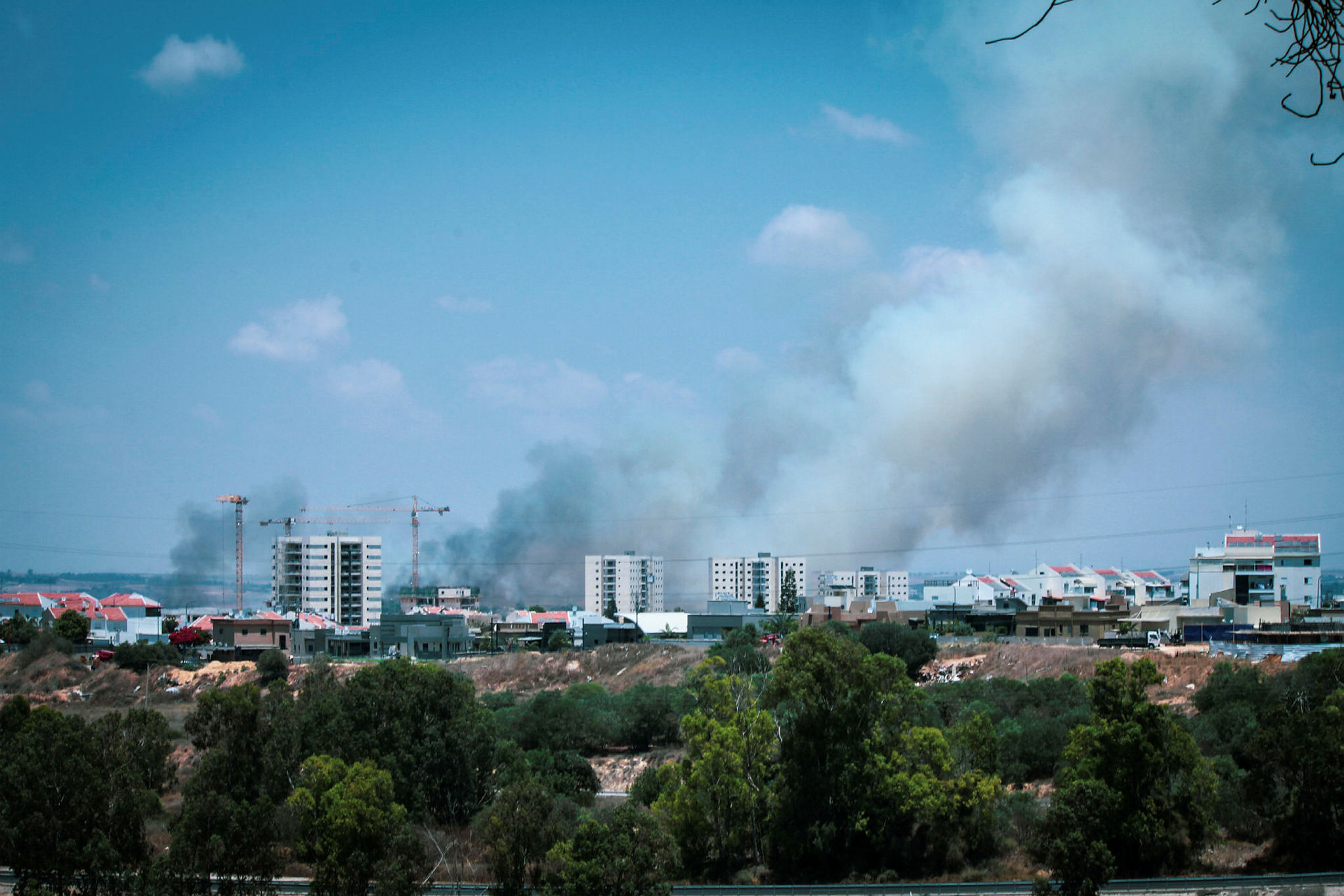Red Cross Finds Little Sympathy Among Israelis Amid Accusations of Ineptitude, Bias
Jerusalem, 27 December, 2023 (TPS-IL) -- “Humanitarianism,” “compassion,” “neutrality”—these are the words the International Committee of the Red Cross (ICRC) would like linked to its name. In Israel, the word more commonly associated with the organization is “mud.”
The ICRC has come in for criticism from the Israeli premier on down, with the public consensus being that the ICRC is at best a glorified taxi service, and at worst the most prominent of the consistently anti-Israel and biased so-called “humanitarian” groups.
Israelis blame the ICRC for failing to reach the hostages held by Hamas. Eighty-one days into the war, the Red Cross still hasn’t managed to gain access to the remaining captives held by the terror group.
Israeli anger has intensified as reports emerge of the grim situation of the abductees, with reports of torture, sexual abuse, lack of food and medical care. Some hostages have been killed in captivity.
The Red Cross is even under fire for facilitating Palestinian “pay for slay” stipends.
The ICRC didn’t help its cause when on Dec. 23 its president, Mirjana Spoljaric, blamed Israel, telling Channel 12 that “both” Hamas and Israel were responsible for the ICRC’s failure to reach the hostages. Yehonatan Sabban, former ICRC spokesman in Israel, said he had to watch the interview four times because he couldn’t believe what he was hearing.
The ICRC’s main defense is that it can’t force its way in to see the hostages. It also says that its modus operandi is to work behind the scenes, the downside being that the public can’t see its efforts.
Sarah Davies, public relations officer for the ICRC “in Israel and the Occupied Territories,” told the Tazpit Press Service, “We know that being a discreet organization is not always popular and keeping to our confidential approach is very frustrating for people. However, we also know from decades of experience that the way we can best influence change for those we want to help is to keep a low profile and advocate for the best interests of those people behind closed doors, directly with those who have the influence to make a difference.”
Red Cross and ‘Rogue Actors’
As the war drags on with nothing to show for its backroom approach, the Red Cross has found it harder to claim that its strategy is working.
Israeli Prime Minister Benjamin Netanyahu, during a Dec. 14 meeting in Tel Aviv, nudged Spoljaric to try exerting public pressure on Hamas. Spoljaric shot back, “It’s not going to work because the more public pressure we would seemingly do, the more they would shut the door.” To which Netanyahu replied, “I’m not sure about that.”
ICRC’s argument—avoiding public condemnation of Hamas for fear it would antagonize the terror group, ending any ICRC influence—is eerily reminiscent of the ICRC’s explanation for why it failed to condemn the Holocaust in World War II. ICRC leadership knew by late 1941 of the Nazi plan to exterminate European Jewry, but chose to remain silent, arguing that if it publicly protested, it would sabotage its ability to help Allied POWs in Germany.
“This argument has often been repeated in defense of the International Red Cross’s inaction on behalf of Holocaust victims during the war,” writes Gerald Steinacher in his book “Humanitarians at War: The Red Cross in the Shadow of the Holocaust.”
Danny Orbach, a military historian at the Hebrew University of Jerusalem, told TPS that the basic problem is that the Red Cross is dependent on the goodwill of the parties.
“Rogue actors, like Hamas, or Nazi Germany, will allow the Red Cross to do some things and not others. Nazi Germany let the Red Cross visit some POWs, but not Jews in concentration camps,” he said. “It could have criticized Nazi Germany and insisted on seeing Jewish prisoners, but then Nazi Germany would probably not have allowed them to see anybody else, and the DNA of such organizations is to try to do as much as is allowed to them. The price—the moral price—is that they give up on the victims who are the most vulnerable.”
The ICRC’s approach could be described as “choosing the lesser evil,” he said, which leads it to sacrifice some in the hope of helping others, just as in World War II: “It’s not out of wickedness. And it’s not out of antisemitism. Though both may exist. But it’s not the main issue,” said Orbach.
A modern concept compounds the problem. It’s the idea that a populace is distinct from its government.
“Theoretically, the Red Cross could say, ‘We won’t give your citizens help until you let us see the Israeli prisoners.’ Today, that’s inconceivable because [the attitude is] ‘Why are the poor people in Gaza to blame for what Hamas is doing?’ In World War II, nobody hesitated to blame the Germans for what the Nazi government was doing,” said Orbach.
As a result, humanitarian groups have no leverage over Hamas. Hamas can turn all its resources to tunnels, rockets and RPGs knowing someone else will care for the civilians.
“The Red Cross, and the international community in general, has created a situation which in economics is called moral hazard. It’s when you have a bank that knows it’s going to be bailed out by the government in the event of bankruptcy, so it takes unnecessary risks. Hamas knows that whatever it does, somebody will rebuild Gaza,” said Orbach.
Despite this, however, if Orbach were advising the ICRC, he would tell it to condemn Hamas.
“Sometimes organizations are perpetually fearful for no reason. Nothing will happen if the Red Cross denounces Hamas. Perhaps it won’t help very much, but it would be some kind of moral statement,” he said.
Second, while Orbach appreciates the ICRC’s need to remain neutral, it should make clear which side completely disregards humanitarian rules and which tries to follow them. There, the Red Cross is guilty of a “moral failure,” he said.
Some say the ICRC’s moral failure goes far beyond this sin of omission. The Geneva-based U.N. Watch has sharply criticized the Red Cross for what it says is blatant bias against Israel in the current conflict.
In a Dec. 11 report, it surveyed ICRC’s social media accounts and found that of 187 tweets published by its main accounts, “77% were focused on criticizing Israel, expressly or by implication. Only 7% of the tweets criticized Hamas.”
The report noted that the ICRC was quick to condemn the bombing of the Al-Ahli hospital, tweeting on Oct. 17, the day of the explosion, that it was “shocked and horrified,” that “hundreds were killed,” among them patients in hospital beds and doctors trying to save lives. Israel released intercepted Hamas communications proving the blast was caused by a misfired Palestinian Islamic Jihad rocket.
In defending her organization from the allegations, ICRC’s Davies told TPS, “In many of our social media posts, we do not refer at all to one party or another. If we speak about a specific incident, for example, al-Ahli Hospital, you will see our language speaks to the humanitarian impact, not allegations of who did what.”
U.N. Watch Executive Director Hillel Neuer told TPS, “The ICRC response is disingenuous and misleading. The entire basis of their ‘shocked and horrified’ Oct. 17 tweet about the al-Ahli hospital was ‘reports’ that it was destroyed and hundreds were killed. Those reports, as published by the New York Times, Reuters and the BBC, referred falsely to an ‘Israeli strike.’ The world was falsely blaming Israel, sparking hatred and attacks against Jews worldwide.
“The fact is that, whether out of malice or recklessness, the otherwise exceedingly diplomatic and cautious Red Cross decided in this case to rush out an immediate tweet about the al-Ahli incident, falsely stating that the hospital was destroyed and that hundreds were killed, and in doing so the organization helped stoke the flames of antisemitism,” said Neuer.
U.N. Watch found the same was true of some 143 other Red Cross tweets, noting the ICRC used “emotive and sometimes hyperbolic language” to describe Palestinian suffering, that would lead the reader to blame Israel. Those tweets left out that Hamas placed its terrorists and infrastructure among civilians.
Neuer said that Israeli suffering, whether from 13,000 Hamas rockets, or from the Oct. 7 attack itself, was “almost never a focus of their tweets, or a matter on which they used emotive or dramatic language.”
Then there is the ICRC’s recent decision to tap former UNRWA chief Pierre Krähenbühl as its new director general, Neuer said, which “only underscores and entrenches their bias against the Jewish state.” UNRWA is widely regarded as a Hamas-dominated organization.
The Jewish Institute for National Security of America (JINSA) also found the Red Cross culpable of anti-Israel bias in a Dec. 18 report. It called for the United States, a major benefactor of the ICRC and its affiliates, to practice “rigorous oversight” and “inform it that future U.S. grants to the ICRC for rebuilding Gaza are being jeopardized by its failure to uphold its mission”—that is, to act as an impartial actor in every conflict.
There is a precedent for applying American pressure to bring change at the Red Cross. It took nearly 60 years for the International Federation of the Red Cross and Red Crescent Societies in Geneva to recognize Israel’s own first aid organization, Magen David Adom, which uses a Red Star of David in place of a cross.
Its final acceptance appears largely due to the efforts of U.S. cardiologist Bernadine Healy, who became president of the American Red Cross in 1999 and fought to correct what she saw as a legacy of antisemitism at the ICRC.
“This is something we must correct, lest the exclusion of Magen David Adom be perceived as partial, biased, discriminatory, or politically driven,” she said in a speech in Geneva two months after becoming president, as reported by The New Yorker in 2001. The report added, “The other federation members were said to be furious at what they considered her presumption.”
Healy convinced the American Red Cross to withhold its five million dollars in annual dues to the ICRC. Although she was forced to step down as president in 2001, reportedly over her aggressiveness on the issue, the ICRC finally relented and admitted Magen David Adom as a full member in June 2006.
Even then, it was forced to share its victory with the Palestinian Red Crescent Society, which was admitted at the same time.







